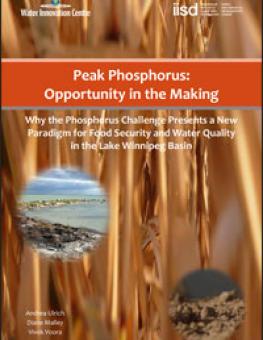
Peak Phosphorus: Opportunity in the Making
The long-term security of our global food and water supplies may be impacted by the mismanagement of our phosphorus nutrient resources. Essential to plant growth and all life, phosphorus is mined from rock phosphate deposits and synthesized into mineral fertilizers destined for agricultural fields. Easily-mined rock phosphate reserves are dwindling and the constraints this could place on fertilizer production pose risks to our long-term ability to feed the planet. Excess phosphorus from agricultural fields runs off the landscape and eventually gets flushed into the ocean, where it takes millions of years to mineralize. Under the right conditions, phosphorus loads can choke water bodies as algae rapidly grow, die and decompose, depriving lakes, rivers, streams and coastal waters of oxygen. This process, referred to as eutrophication, threatens the security of our freshwater supplies and aquatic ecosystems. Phosphorus is fundamental to long-term food security, yet we mismanage it, allowing excess phosphorus to imperil our water resources.
Within the Canadian Prairies, "peak phosphorus" could have serious economic consequences. Rising fertilizer costs will hit the bottom lines of agricultural producers, which may result in higher food costs. Phosphorus mismanagement is also being exhibited within the water bodies of the region. Lake Winnipeg, which drains the Canadian Prairies, is the most eutrophic large lake in the world. This situation clearly points to a need to better manage phosphorus resources by finding more effective ways to use, recover and recycle this precious nutrient.
Fortunately, opportunities to accomplish this are abundant. Adopting agricultural practices that improve plant nutrient uptake and limit phosphorus runoff can lower application requirements. Phosphorus recovery from manure and human and food waste can also lower our dependence on mineral fertilizers. For instance, phosphorus recovery systems could become standardized within wastewater treatment plants. Composting manure as well as human and food waste also represents an important source of phosphorus. Closing the loop on our food systems and moving toward phosphorus independence are crucial to ensuring the long-term security of our food and water supplies. Treating phosphorus as a finite resource shifts our management paradigm from mitigating a noxious substance to recovering and recycling a precious element.
Participating experts
You might also be interested in
Sustainable Asset Valuation of Sherwan Hill Adventure Park in Abbottabad, Pakistan
This report analyzes the social, economic, and environmental benefits of the Sherwan Hill Adventure Park in Pakistan.
December 2024 | Carbon Minefields Oil and Gas Exploration Monitor
In November 2024, 23 oil and gas exploration licences were awarded across five countries, with Russia granting the licences that account for the largest portion of embodied emissions.
Toward a Coherent, Transformative Approach to Financing Sustainable Development, Climate, and Nature
Four key proposals for the Fourth Financing for Development Conference (FfD4) to create an integrated, equitable approach to financing climate, nature, and development goals.
Green Public Procurement in India
This report analyzes the status of green public procurement (GPP) in India and suggests key strategies for advancing sustainable procurement practices.